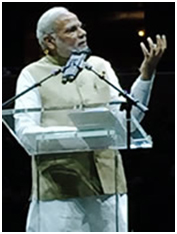Indian Prime Minister Narendra Modi
 Indian Prime Minister Narendra Modi – Photo: RP
Indian Prime Minister Narendra Modi – Photo: RP
The same week that Pope Francis and President of the People’s Republic of China Xi Jinping visited the U.S., Indian Prime Minister Narendra Modi visited the Bay Area. After private conversations with a whole host of Silicon Valley leaders over a two-day period, PM Modi spoke to 20,000 members of the Indian and Bay Area community on Sunday evening, September 27, at SAP Center in San Jose. The visit was certainly a call to the expatriate community to both recognize and appreciate the advances that India is producing in technology, space, and environmental cleanup, but also a call to Indians now living in the US to keep alive their loyalty and commitment to the future of India.
As Modi’s speech was almost entirely in Hindi, some in the audience like myself relied on translators and delayed transcribers. One section of Modi’s talk dealt with the realities of terrorism and conflict, risks and threats that many nations face, including India. Here are paraphrases of his comments.
Terrorism is terrorism. There is no good terrorism and bad terrorism. I have been dealing with terrorism for 40 years.
The UN still hasn't been able to define terrorism and that can be an impediment to determining solutions.
We need to have clear definitions or else how will we tackle it? There cannot be any compromise on terrorism, it is destructive to human progress and development wherever it occurs.
Narendra Modi says India has accepted the challenge to work against terrorism and global warming.
Terror and global warming are two pressing issues the world faces. We need to mitigate these two menaces.
The Graduate Theological Union has a unique opportunity to work at issues of religious difference which certainly contribute to tension, conflict, scapegoating, and terrorism. While sustainability is frequently linked to issues of climate and environment, sustainability also includes the development of sustainable relations or the ability of communities to interact and share space and resources with civility and respect for religious and cultural differences. Many of the programs of the GTU focus on issues that have engendered division and conflict in the wider world but which are addressed jointly by members of those communities who have learned the skills of appreciative inquiry and the capacity to listen with empathy. Students in the Masters and Doctoral level programs are encouraged to do interreligious work, not only to broaden their experience and perspective but to learn and better evaluate the uniqueness of their own tradition.
Within the past year, the GTU has added courses in Hinduism, Jainism, and Sikhism, all of which had their origins in India. Students are interested in both the histories of these religions and their contemporary expressions, and there will be many opportunities in the future for the public to learn more about these religions and their unique wisdom traditions and practices.
